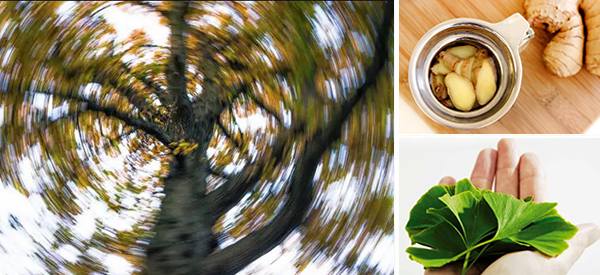
5 Natural Remedies for Treating Vertigo
Vertigo can be a life-changing condition. Many people experience vertigo occasionally but if you suffer from chronic vertigo you never know when the world around you will suddenly begin to spin. Dizziness isn’t the only symptom that vertigo sufferers experience. Vertigo can also be associated with headaches, nausea, and anxiety.
Because vertigo can strike at any moment you should avoid dangerous activities like driving a car until the condition is under control. While there are many causes of vertigo, one of the most common is BPPV or benign positional paroxysmal vertigo. BPPV is caused by a displacement of calcium crystals, called canaliths, in the ear canal. When these crystals are displaced they affect your sense of balance causing you to experience vertigo.
Migraines and other inner ear problems like infections can also cause vertigo. If you experience vertigo don’t despair. There are many natural remedies that can help you overcome this condition.
1. Ginkgo Biloba
 Studies have shown that Ginkgo Biloba is effective at treating vertigo. Ginkgo is associated with Chinese medicine but the tree can be found growing throughout the United States. A large tree that can grow to over one hundred feet tall it grows well in direct sun. It is a common ornamental tree in cities as it thrives in disturbed land. The leaves have a distinctive fan shape and change to a beautiful yellow in fall.
Studies have shown that Ginkgo Biloba is effective at treating vertigo. Ginkgo is associated with Chinese medicine but the tree can be found growing throughout the United States. A large tree that can grow to over one hundred feet tall it grows well in direct sun. It is a common ornamental tree in cities as it thrives in disturbed land. The leaves have a distinctive fan shape and change to a beautiful yellow in fall.
You can harvest the Ginkgo leaves when they turn yellow in the fall to make a tincture to treat your vertigo or purchase Ginkgo in capsules. You can make a tincture easily in your own home with materials you likely have already.
Ginkgo Biloba Tincture
- 3-4 ounces of ginkgo leaves (you can use dried leaves as well)
- Vodka (or other alcohol at least 80 proof)
- Mason jar
- Coffee filter
- Funnel
- Tinted bottles for storage
Related: How Long Do Dried Herbs, Ointments, Syrups and Tinctures Last?
Steps:
 First, crush the leaves to increase the surface area
First, crush the leaves to increase the surface area- Place the crushed leaves in the mason jar
- Cover the leaves with vodka to a minimum of two fingers above the top of the roots. If you are using dry leaves add more vodka as the material will absorb the liquid. Do not exceed double the height of leaves or your tincture will not be as strong.
- Seal the jar and leave in a cool dark place for at least two weeks
- When your tincture is ready place a coffee filter inside a funnel and strain the liquid into a tinted bottle for storage.
- Store in a cool dark place
Use a little as a few drops to start and no more than a teaspoon daily.
2. Blessed Thistle
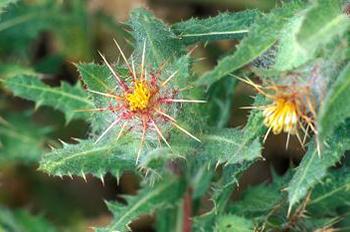 Blessed thistle, Cnicus benedictus, is a plant native to the Mediterranean region that is now commonly found growing in North America. A member of the thistle family, it can grow to two feet tall and produces yellow flowers surrounded by small spines. It has been used in traditional remedies since the Middle Ages to treat vertigo and other conditions.
Blessed thistle, Cnicus benedictus, is a plant native to the Mediterranean region that is now commonly found growing in North America. A member of the thistle family, it can grow to two feet tall and produces yellow flowers surrounded by small spines. It has been used in traditional remedies since the Middle Ages to treat vertigo and other conditions.
The flowers, leaves, and stems can be harvested from June until August and used to make either tea or a tincture. To make a tincture follow the recipe for the Ginkgo Biloba but replace the Ginkgo leaves with leaves, flowers, and stems from the blessed thistle. Use just a few drops to start and don’t exceed a teaspoon daily.
3. Ginger
Ginger is one of those plants that have many uses, medicinal and culinary. There is evidence that shows ginger is an effective treatment for vertigo and accompanying nausea.
Ginger is excellent when it comes to increasing the circulation of your blood. If you are feeling dizzy, chew on a little fresh ginger or drink ginger tea several times a day.
You can use ginger to make a spicy tea that will help alleviate your vertigo. Use either fresh or dry ginger rhizomes to make tea.
Ginger Tea
 slice the ginger finely
slice the ginger finely - place 1-2 tablespoons of sliced ginger in a cup
- Pour 8 ounce of boiling water over the sliced ginger
- Let steep for 5-10 minutes depending on how strong you prefer
- Strain
You can sweeten the tea with honey to taste.
4. Lemon Balm
Lemon balm is believed to have healing properties that help with nervousness and vertigo. This is, in part, attributed to the health effects of the balm on the circulatory and nervous systems. The latter is important because vertigo results from the constant sending of nervous signals from the ear.
Considered one of the fastest home remedies, lemon balm is effective in treating vertigo, migraines, insomnia, nervous tension, and even depression.
You can rub its leaf and take a whiff to smell the cozy subtle lemon aroma of its leaves. Lemon balm oil helps you stay calm and relaxed because it reduces stress.
Drinking the strained tea of dried lemon balm seeped in a cup of boiling water can be an almost immediate relief for vertigo attacks.
Lemon Balm Tea
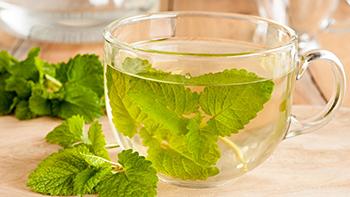
- Place the cup of water in a pan and boil.
- Add the lemon balm to the hot water and lower the heat to let it simmer for 10 minutes.
- Pass the tea through a strainer and drink daily to help alleviate the symptoms of vertigo.
You may also inhale the balm as it simmers.
Do this for about 5 minutes to allow you to regain some balance and reduce the ‘off-balance’ feeling.
5. Exercise
Exercise is a common way to treat vertigo and is particularly effective in treating BPPV. While there are several different exercise regimes to choose from, the most common is the Epley maneuver. A series of movements designed by Dr. Epley, this maneuver is designed to return the displaced calcium crystals to where they belong. This will then relieve the feelings of dizziness and loss of balance.
To perform the Epley maneuver simply follow these steps:
For the right ear
 Begin by sitting on a bed
Begin by sitting on a bed- Turn your head 45 degrees to the right
- Lie back onto a pillow, keeping your head turned to the right
- With your head reclined on the pillow, stay in position for 30 seconds
- Next without raising your head, turn 90 degrees to the left so you end with your head positioned 45 degrees to the left
- Stay in the position for 30 seconds
- Now turn your head and body another 90 degrees to the left so you are facing into the bed
- Stay in the position for 30 seconds
- Sit up on the left side
Do the same for the left ear.
After completing the Epley Maneuver you may experience immediate relief. However, you may find you need to repeat the maneuver a few times to get the crystals to return where they belong. Once your vertigo has subsided you can stop the exercises.
Get Plenty of Sleep and Stay Hydrated
All of us suffer from bouts of insomnia from one time or another. As a vertigo sufferer, insomnia can exacerbate your symptoms. The longer you go without sleep the more likely you are to find yourself facing the consequences and experiencing dizziness and loss of balance.
Having a regular sleep routine can help ensure that you get enough sleep each night. Also, avoid caffeine and alcohol which can disturb your sleep patterns.
Dehydration can be another factor in triggering vertigo. While staying hydrated is always important it is even more important if you suffer from vertigo. You may have heard to drink 64 ounces of water per day but current standards now recommend that you drink between half an ounce to an ounce of water for every pound you weigh. To stay hydrated in hot weather you should make sure you are consuming on the higher-end of these guidelines. By keeping yourself hydrated you can eliminate one of the factors that can trigger bouts of vertigo.
While vertigo can be life-altering, with these simple home remedies you can begin to regain control of your life. Taking simple steps like staying hydrated and getting plenty of sleep can make a real difference. And when you are faced with an attack of vertigo, knowing exercises and herbal remedies can help you regain your equilibrium.
You may also like:
 8 Natural Ways to Heal Tinnitus
8 Natural Ways to Heal Tinnitus
Why You Should Put Garlic in Your Ear Before Going to Sleep (Video)

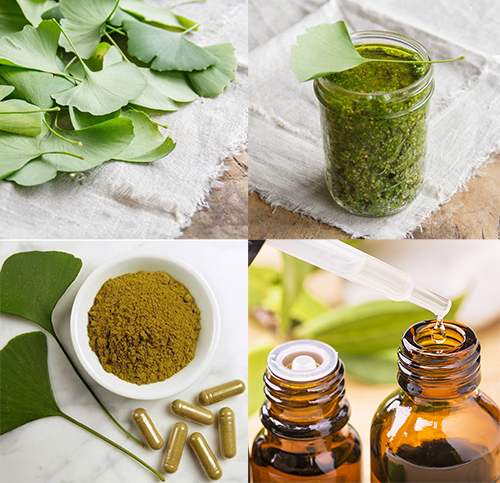 First, crush the leaves to increase the surface area
First, crush the leaves to increase the surface area
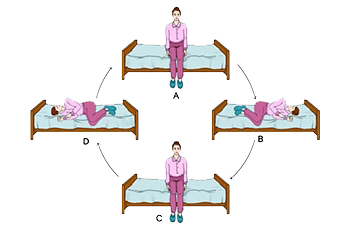 Begin by sitting on a bed
Begin by sitting on a bed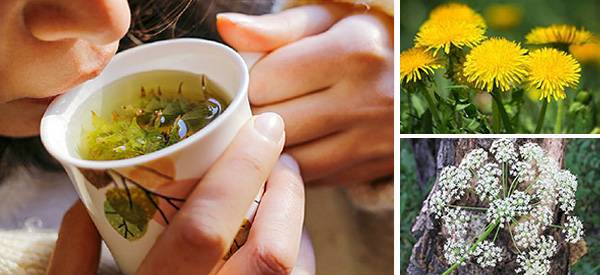


In this article you do not mention how to administer the Genkco. You mention a few drops but not more than a teaspoon, is this taken directly orally or in a tea?
Hi Moyra,
Thank you for your interest in our work.
Tinctures can be used in one of three ways: sublingually, orally, or by being added to foods or liquids.
Use a little as a few drops to start and then you can increase the dose to 3 x daily 25 drops before eating (recommended with some water).
God bless!
Thanks for this question. I was going to ask the same thing.
Thank you so much for these tips! I have Meniere’s disease so the Epley maneuvers don’t work for me (unfortunately!) but it’s good advice for anyone with BPPV. I can’t wait to try the lemon balm tea.
Hi Kathy,
Thank you for your comment.
We are sorry to hear about Meniere’s disease.
Wish you the best of health!
God bless!
Okay my question is “What about lemon balm tea Bags?” Or should it be made from the plant?
Hello, I’m wondering about my climate and some of these plants. I live in Mesa AZ, our summers are brutally hot, with this summer being the hottest on record. I’m wondering if some of these plants would have a hard time surviving the heat here? The climate zones here are 9b for plant hardiness and 13 by Sunset zone standards. So I’m just wondering if I can keep these plants alive in the summer months. Any advice would be greatly appreciated! Thank you!
Hi Gina,
Thank you so much for your interest and question.
If you are asking about the Medicinal Seed Pack, generally, Chicory, Echinacea, Meadowsweet, Evening Primrose can survive in partial shade. Yarrow, Moringa, and Peppermint perform best in full sun, but if peppermint receives about five hours of sun per day, it can grow just fine.
Chamomile, California Poppy and Calendula prefer full sun, but partial shade is a better choice in warmer areas.
Plant Name Hardiness Zones
Chicory 2-9
Yarrow 3-9
California Poppy 5-10
Peppermint 3-11
Chamomile 3-9
Evening Primrose 3-11
Meadowsweet 3-9
Echinacea 3-9
Calendula 2-11
Moringa 9-11
Please let us know if there is anything else we can help you with.
God bless!
Many years ago, I had dizziness so bad that I had to crawl instead of walk. I researched and found that gingko was commonly used in Europe. By the time I finished one bottle of gingko, I was healed. I had been to many specialists and had a CAT scan. The specialists said there was nothing they could do to help me. I’ve taken gingko every since then.
Hi Dawn,
Thank you so much for sharing your experience with us.
We are glad to hear that Ginkgo Biloba worked for you.
Wish you the best of health!
I need help with Tinnitus..
Hi Donna,
You can find more information about Tinnitus in this article:
https://thelostherbs.com/8-natural-ways-to-heal-tinnitus/
God bless!
Would the effectiveness of these herbs in a capsule be just as helpful or do I have to take the time for the teas? As a busy mom I’m thinking swallowing a capsule would be easier but I’ll make the time to brew the teas if necessary. Thank you.
What herbs would help with neuropathy peripheral carpal tunnel
Years ago I had vertigo very bad and my world spun opening my eyes. A nurse friend told me to get hydrated. I had been taking medicine prescribed by a medical doctor. It didn’t help at all. Making it a point to drink about 3 quarts of water a day resolved the problem in about 3 days. I make it a point to stay hydrated as spinning laying in bed is no fun.